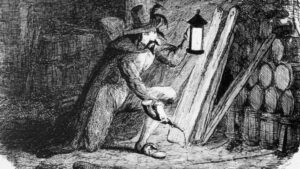Guy Fawkes Night
Guy Fawkes Night
On 5 November, people across the UK celebrate Guy Fawkes Night with bonfires, fireworks, sparklers and delicious traditional British food. This annual celebration is also called Bonfire Night, Guy Fawkes Day and Fireworks Night.
The reason why it’s celebrated is because it’s the anniversary of a failed attempt to blow up the Houses of Parliament in London, hence its association with gunpowder and fire.
Within a few decades after the event, bonfires were lit across the nation and it quickly became the predominant English state commemoration. Traditionally, there’s a dummy man on top of the bonfire called ‘Guy’. He represents a man who was part of the plot, called Guy Fawkes. Nowadays it’s not unusual for more modern effigies to be burned on the pyre. In recent years British Prime Minister Boris Johnson has even been burned!
What was the Gunpowder Plot?
Guy (Guido) Fawkes was part of the Gunpowder plot in 1605. His group wanted to blow up King James I and his government.
This was primarily the result of religious strife. England was a Protestant country whilst the plotters were Catholic. They wanted England to be Catholic again and thought that with the assassination of its current leaders, England would return to Catholicism.
So, Fawkes and his group of 12 conspirators placed 36 barrels of gunpowder in the cellars below the Houses of Parliament. If successful, this quantity of gunpowder would have caused a massive explosion.
However, the plot was revealed to the authorities by an anonymous letter sent by one member of the Gunpowder group to his friend in Parliament, in which he warned him to stay away on 5 November.
The King’s supporters got hold of the letter and the plot failed. Guards broke into the cellars where Guy Fawkes was waiting. He and his co-conspirators were arrested, tortured, and later executed.
This engraving shows Fawkes inspecting his barrels of gunpowder.
All British people will know the following rhyme about Guy Fawkes Night:
Remember, remember, the fifth of November!
Gunpowder treason and plot
We see no reason why Gunpowder treason
Should ever be forgot.
It is said to have originated as a song sung by the impoverished young children who were paid to collect wood for the bonfires. But now it is recited by people, rich and poor, across the nation. Why don’t you sing it when you go visit some firework or bonfire displays?







